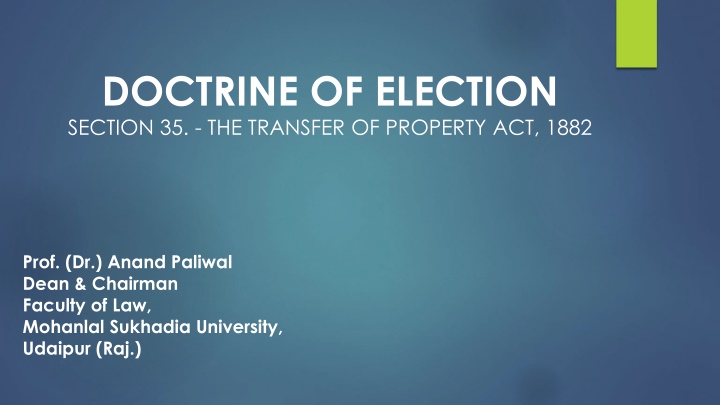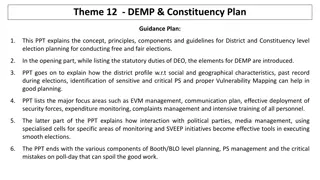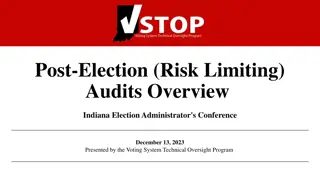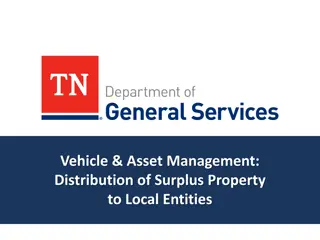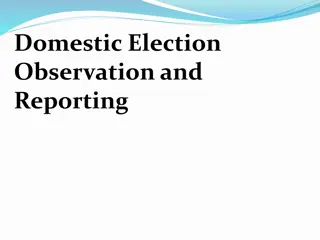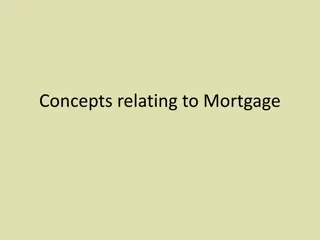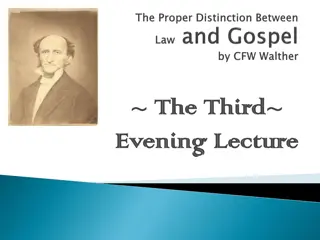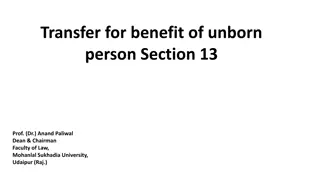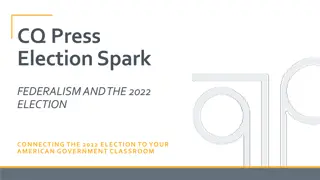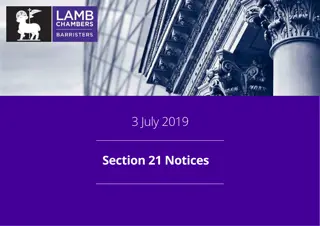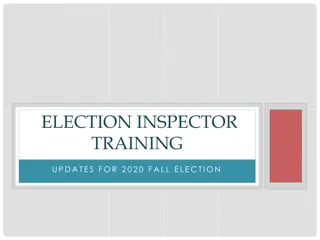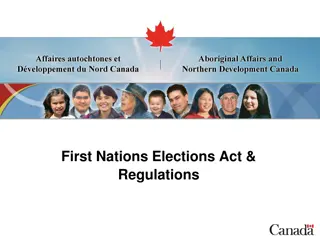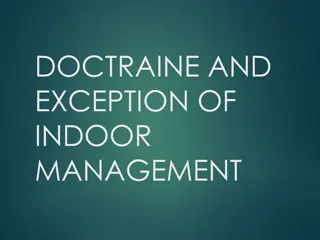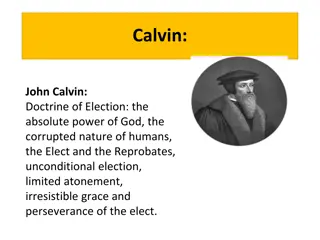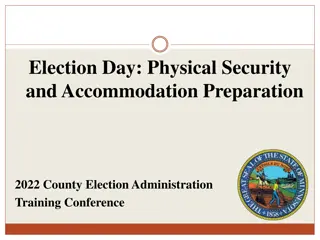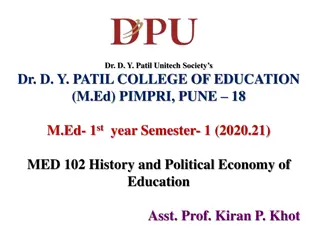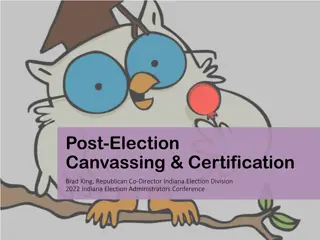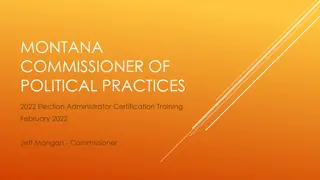Doctrine of Election under Section 35 of the Transfer of Property Act, 1882
The doctrine of election under Section 35 of the Transfer of Property Act, 1882 deals with situations where a person professes to transfer property he does not own, and the owner must elect to confirm or dissent. If the transfer is gratuitous and the transferor is unable to make a fresh transfer, the disappointed transferee must be compensated. The rules also cover instances of indirect benefits and exceptions regarding specific benefits. Knowledge or waiver is crucial for confirming the transfer.
Download Presentation

Please find below an Image/Link to download the presentation.
The content on the website is provided AS IS for your information and personal use only. It may not be sold, licensed, or shared on other websites without obtaining consent from the author.If you encounter any issues during the download, it is possible that the publisher has removed the file from their server.
You are allowed to download the files provided on this website for personal or commercial use, subject to the condition that they are used lawfully. All files are the property of their respective owners.
The content on the website is provided AS IS for your information and personal use only. It may not be sold, licensed, or shared on other websites without obtaining consent from the author.
E N D
Presentation Transcript
DOCTRINE OF ELECTION SECTION 35. - THE TRANSFER OF PROPERTY ACT, 1882 Prof. (Dr.) Anand Paliwal Dean & Chairman Faculty of Law, Mohanlal Sukhadia University, Udaipur (Raj.)
Where a person professes to transfer property which he has no right to transfer, and as part of the same transaction confers any benefit on the owner of the property, such owner must elect either to confirm such transfer or to dissent from it: and in the latter case he shall relinquish the benefit so conferred, and the benefit so relinquished shall revert to the transferor or his representative as if it had not been disposed of, subject nevertheless, where the transfer is gratuitous, and the transferor has, before the election, died or otherwise become incapable of making a fresh transfer, and in all cases where the transfer is for consideration, to the charge of making good to the disappointed transferee the amount or value of the property attempted to be transferred to him.
The farm of Sultanpur is the property of C and worth Rs. 800. A by an instrument of gift professes to transfer it to B. giving by the same instrument Rs. 1000 to C. C elects to retain the farm. He forfeits the gift of Rs. 1,000. In the same case. A dies before the election. His representative must out of the Rs. 1,000 pay Rs. 800 to B. The rule in the first paragraph of this section applies whether the transferor does or does not believe that which he professes to transfer to be this own. A person taking no benefit directly under a transaction, but deriving a benefit under it indirectly, need not elect. A person who in his one capacity takes a benefit under the transaction may in another dissent therefrom.
Exception to the last preceding four rules- Where a particular benefit is expressed to be conferred on the owner of the property which the transferor professes to transfer, and such benefit is expressed to be in lieu of that property, if such owner claims the property, he must relinquish the particular benefit, but he is not bound to relinquish any other benefit conferred upon him by the same transaction. Acceptance of the benefit by the person on whom it is conferred constitutes an election by him to confirm the transfer, if he is aware of his duty to elect and of those circumstances which would influence the judgment of a reasonable man in making an election, or if he waives enquiry into the circumstances.
Such knowledge or waiver shall, in the absence of evidence to the contrary, be presumed, if the person on whom the benefit has been conferred has enjoyed it for two years without doing any act to express dissent. Such knowledge or waiver may be inferred from any act of his which renders it impossible to place the persons interested in the property professed to be transferred in the same condition as if such act had not been done.
X Property A C Benefit Transferor Transferee B Owner of Property
A who is transfer professes to transfer property to C transferee and as part of same transaction confers benefit to owner of property. Now B owner of property has choice i.e. either to transfer property to C and avail the benefit Or Retain the property and reject the benefit; Therefore B has to elect one out of two choices available before him. - If B accept the benefit then the property will be transferred to C - If B enjoy the benefits for a period of two years then also it will be presumed that B has given the consent to transfer the property. - If B does not elect his option with one year of the transfer of property then A or his representative would require to elect his choice. Even after the reasonable time, if B does not still elect then if will be assumed that B have elected the validation of property transfer as his choice. - If the Status Quo of property being rendered impossible to be restored after it being used by B then also it means Yes to the proposal of A.
The doctrine is based upon three broad principles. - The first is that every man who effects by a legal instrument to dispose of property must be taken to intend all that he has expressed and that such intention must be given effect to. - The second is enunciated by the maxim allegans contraria non est audiendus, which expresses, in technical language, the trite saying of Lord Kenyon, that a man shall not be permitted to "blow hot and cold" with reference to the same transaction, or insist at different times, on the truth of each of two conflicting allegations, according to the promptings of his private interest. -The third is enunciated by the maxim qui sentit commodum sentire debet et onus he who derives the advantage ought to sustain the burden.
The doctrine of election applies to all kinds of property and all interests in property. It applies to all persons claiming property in any character. In applying the doctrine no distinction is made between a personal estate and a real estate, between a specific legatee and residuary legatee, or between legatees and the next of kin of the intestate. In order that the section may apply. it is essential that- (1) there should be property not belonging to the transferor, i.e., property to which he has no right to transfer, (2) the transferor must profess to transfer, such property and (3) as part of the same transaction of transfer, the transferor must confer some benefit on the owner of such property.
Grants from the Government. The doctrine of election does not extend to the grants from the Government, as such grants are saved from the operation of this Act by S. 2 of the Government Grants Act, 1895. Property transferred must belong to another. No case for election would arise unless the property transferred is one which the transferor has no right to transfer. Professes to transfer property The second essential is that the transferor should have professed to transfer property, which as a fact, did not belong to him.
Confers any benefit on the owner. The doctrine of election does not apply unless a benefit is conferred on the owner of the property which is professed to be. As part of the same transaction. The principle underlying this section being, that a person cannot "blow hot and cold" in respect of the same transaction, the operation of the section is expressly limited to cases where a person professes to transfer property which he has no right to transfer and as part of the same transaction confers a benefit upon the owner of the property so transferred.
Such owner must elect. The words "confers any benefit on the owner of the property" and "such owner must elect" show that a case for election arises only where a person transfers property belonging to another and at the same time confers a benefit on him. It is clear, therefore, that unless a person is the "owner" of the property professed to be disposed of by the transferor, he is under no obligation to elect.
Charge in favour of the disappointed donee. Where the owner of the property transferred elects to dissent from the transfer, the disappointed compensation - (1) In all cases where the transfer is for consideration, and (2) Where the transfer is gratuitous, only when the transferor dies or becomes otherwise incapable of making a fresh transfer, before the election takes place. transferee is entitled to Election by a party binds his representative but not others. An election when made by a party is binding not only on himself but also on his representative. Rule cannot be applied to cure an illegality. The rule of election cannot be so applied as to enable the transfer to evade any rule of law.
Presumption of election from two years' enjoyment. The seventh paragraph of the section corresponds to clause (1) of S. 188 of the Indian Succession Act, 1925. It raises a presumption that a person who has enjoyed the benefit under a transfer for the period of two years, without any expressed act of dissent, must have been doing so with the knowledge of his duty to elect and the circumstances necessary to make an election or must have waived enquiry into the circumstances.
Impossibility of restoring status quo The eighth paragraph of the section corresponds to cl.(2)of S. 188, Indian Succession Act, 1925, and provides that the knowledge or waiver referred to in the sixth paragraph may be inferred from any act of the party bound to elect, which renders it impossible to place the persons interested in the property professed to be transferred in the same condition as if such act had not been done.
Time limit for election The ninth paragraph of this section corresponds to S. 189: Indian Succession Act, 1925, and prescribes a time limit for election. Though a presumption that a person has elected to confirm the transfer can be drawn from his enjoyment of the benefit under the transfer for a period of two years, the transferor or his representative need not wait till that period. They can require the party to make the election if he does not signify his intention to confirm or dissent from the transfer within one year of the date of transfer and if he fails to comply with the requisition within a reasonable time he will be deemed to have elected to confirm the transfer.
Election by a person under a disability In the case of a minor who is under a duty to elect, the election is, under this paragraph, postponed until he attains majority or until the election is made by a lawful guardian or other competent authority. Transferor's disability and election The basis of the rule is not the personal disability of the transferor but the general inability which precludes everyone from disposing of what does not belong to him. Ratification Cases of ratification must be distinguished from cases of election. For ratification, properly speaking, refers to acts done on behalf of the ratifier.
